
Loading..
My Store
Hours of Operation
Find your nearest store
Results
Loading...
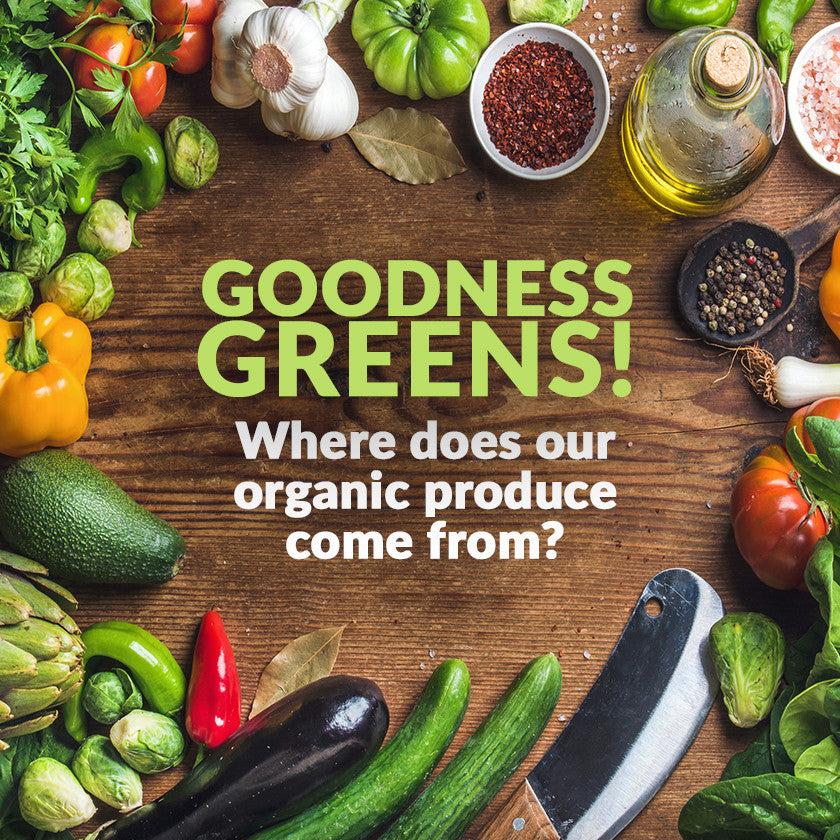
We all take that trip through the produce section every grocery trip, sometimes even willingly. It's an important part of staying healthy! But are the fruits and veggies you're buying also healthy? Sometimes, when the produce is delivered from overseas or across the border, it can be hard discerning exactly where it came from and what went into growing it.
The best way to get to know your food is to get to know the people who make your food. Goodness Me!'s organic produce is reliably sourced from a number of great farms in our community. Here are four of them!
Primarily run by the Beyers Brothers, Meiring and David, Beyers & Jacks Organic Farm produces over 20 crops exclusively for Goodness Me!. These hard-working farmers are focused on practices that help sustain or even improve the soil condition while also enhancing biodiversity. Their “agri-ecology model” uses zero pesticides or herbicides - not even the organic versions! The priority is always organic and non-GMO seeds, and for them, this is non-negotiable. They are also professionally, third-party organic certified from Pro-Cert Organic. The farm is annually inspected, and everything is checked and double-checked, from the seeds to what's done with oil changed in tractors!
They run both greenhouses and a farm of about 100 acres (though only 15 acres are cultivated this year). Outside, spring planting is a back-breaking process, with roughly 40,000 plants planted by hand. They seed in February and March and plant in late March and April for frost-hardy vegetables, a strategy that also helps them beat insects as crops will be bigger by the time the bugs emerge.
When you don't use pesticides, ingenuity is the best way to beat nasty pests! To make it harder for insects such as cabbage loopers and flea beetles to establish thriving colonies and easier for predator pests colonies to grow and compete, Beyers & Jacks use minimum monoculture across an acre. In order to attract helpful insects like bees and for additional biodiversity, they always intentionally introduce flowers in some form.
When you farm as naturally as the Beyer brothers, there are always some level of pest damage on crops; it's the nature of farming naturally. As such, blemish free is highly unlikely, but it’s also highly unnatural. While they have a lot of weeds (admittedly more than they would want), Beyers & Jacks also know that some of them can be used to the crop's benefit. The weeds create ecology for predator colonies, create a lot of shade to help create cooler micro-climates for plants, and help expand biodiversity. They do what they can to reduce weed pressure, but it can be back-breaking work.
Harvesting is done all by hand, which is both labour and time intensive. They harvest Monday through Thursday, trying to get the harvest done as close as possible to the pickup dates for farm fresh supply. Weeding, field cultivation, irrigation, and whatever else all happen in parallel and from Friday to Sunday. This is all balanced with weather and other farm related pressures, making it a 24/7 operation!
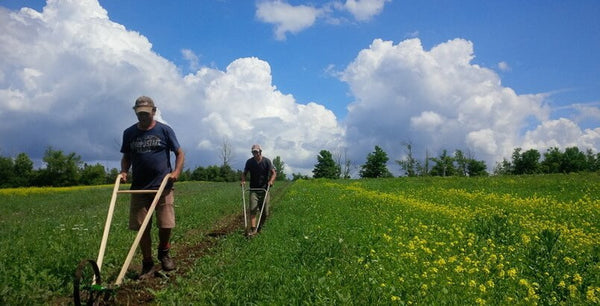
The Pfenning family has been farming since the late 1600’s, as far back as documented family history exists! Back then, “organic” farming was just called “farming”, but as chemicals were introduced into agriculture, Adam Pfenning and his son Wilhelm embraced the modern farming techniques and enjoyed their short-term yield increases. However, by 1950, Wilhelm was starting to realize that he was sacrificing his own health because of all the chemicals he was using and he started to question the nutritional value of the crops he was growing.
In 1952 he made his first attempt at chemical-free farming, but community pressure and a lack of expertise led him back to modern agriculture for a short time. His health continued to get worse, however, mainly from exposure to mercury-based seed treatments. After a lot of reading and question-asking, Wilhelm started developing contacts with like-minded farmers. Thirteen years after his first attempt, Wilhelm decided to give organic farming another try.
It was difficult to farm differently from his neighbours in Gnodstadt, the small Bavarian village where the Pfenning family had lived for hundreds of years, and pressure from both neighbours and family was intense at first. But in 1968, the local bakery reluctantly gave in to Wilhelm’s insistence and started stone milling fresh flour from his organic grains (today it's still thriving, baking very popular organic sourdough bread). Unfortunately, the Pfenning family was forced to move when Wilhelm’s ancestral farmstead became part of the planned roadway of the expanding Autobahn system. Wilhelm and his wife decided to move themselves and all four children to Canada in the fall of 1981. The family immediately started farming on the land where they are located to this day.
Today, the farm is operated by his sons Wolfgang and Ekkehard. Even though Wilhelm passed away in 2011, his wisdom and experience act as a guide and measure for the daily decisions that are necessary in running a farm. With hard work and some luck, the next generation of Pfennings will be ready and able to join the family business!
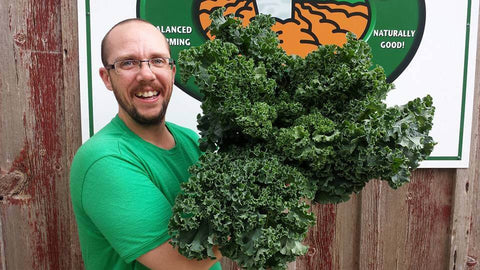
via Pfenning's Organic Farms on Facebook
Slegers Greens is a family-owned greenhouse operation located at the edge of Strathroy. While producing greens since 1987, they went through several growing trials to find organic techniques that were effective, becoming certified organic in 2004.
Organic is important to the Slegers family. They’re committed to organic agriculture because they firmly believe that organic greens are healthy for consumers and good for the environment. They’re also firmly planted in the community, and being a small farm has made them appreciate selling greens locally. The Slegers are proud members of Local Food Plus, a non-profit that brings consumers and their local food producers together.
Slegers Greens chooses to grow their greens with the roots attached because they want customers to get the freshest raw food available, with living enzymes that promote good digestive health. They are always experimenting with improved growing techniques, and the Slegers and their staff keep innovating with new ways to keep improving quality and shelf life!
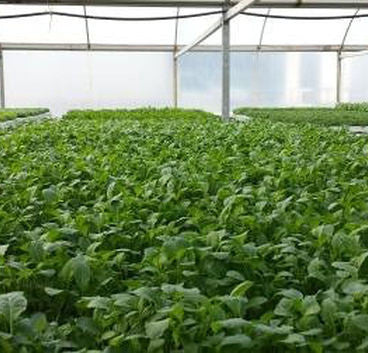
Kind Organics was formed in 1999 on a 100-acre rural property in King Township. It ran as a 20 member Community Supported Agriculture share farm for two years before making the move to the Holland Marsh, 40 minutes north of Toronto. In 2016 they managed, with the help of many loyal customers, to buy a small farm near Brantford, Ontario.
Kind produces certified organic pre-washed salad blends, sprouts, wheat grass, micro greens, culinary herbs, edible flowers, and various kinds of baby greens. They use organic farming techniques and non-GMO seeds, but more than that: they’re bee friendly! Certified bee friendly!
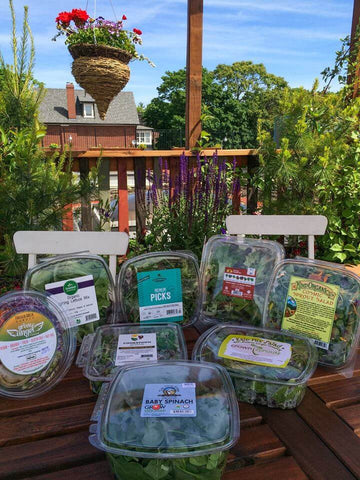
Bee Friendly Farming (BFF) is an initiative that encourages growers to improve the health of one of the Earth's most important pollinators. The label “Bee Friendly Farmer” is an inclusive term intended to recognize anyone who supports bees on all scales of landscape – farms, ranches, businesses, school groups, gardeners, beekeepers, local governments, and non-profit organizations, on both private and public grounds.
The widely-reported disappearance of honeybees (due Colony Collapse Disorder, or CCD) brought public attention to the issues facing both the honeybee industry and native pollinators. One common factor found in hives lost due to CCD is nutritional stress, due to a lack of access to a wide variety of plants that provide food (forage). A common factor in the decline of native bee populations is a decrease in land available for nesting.
Bees, as the insect group that does a majority of the pollination work, are responsible for providing 30% of the crops produced in the world - meaning every third bite that meets your lips depends on pollination. Their health is important to our health!
Much like mankind's relationship to the bees, Ontarians depend on family and local farms to provide us with chemical-free fruits and vegetables. Support communities that work hard to support our health, habitats, and the planet - buy local organic produce!
{"one"=>"Select 2 or 3 items to compare", "other"=>"{{ count }} of 3 items selected"}
Leave a comment